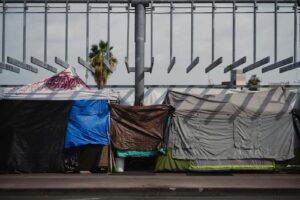What if Christmas was invented in 2014?
 You might have visited your local church, attended your child’s nativity play or even visited a local appliance shop using hoovers to recreate the birth of Christ. Have you ever wondered what the nativity story would be like if it took place today?
You might have visited your local church, attended your child’s nativity play or even visited a local appliance shop using hoovers to recreate the birth of Christ. Have you ever wondered what the nativity story would be like if it took place today?
Let’s break this down. If a couple of homeless immigrants with a new born son came knocking on your door, would you let them in?
Even if the effects of the economic crisis have encouraged people to reconsider their views on who might be affected by poverty, many people have harsh attitudes towards the homeless, as demonstrated by St Mungo’s ‘street stories’:
‘You’re just unseen aren’t you? People don’t see you, you’re invisible. You’re just f’ing invisible and people treat you like that because they want to’ is what Mary and Joseph might have said…
When it comes to their status in Bethlehem as immigrants, around 70% consider immigration a problem for the country (even less than 20% think it is a problem locally) and that the country should accept fewer asylum seekers.
Whether they’d been classified as a ‘hard working’ or a ‘troubled family’, Jesus’ parents would probably have had to depend on charity handouts for this Christmas and be rehoused in ‘out of area’ temporary accommodation. They might even have been sent to jail if they had been caught squatting in a manger.
Civic by design, dignity by default
But they might also have encountered the equivalent of the Three Wise Men?
What if they had met Sandra Perry from Dudley reinventing hostel accommodation embedded in the community? What if they had found a ‘tiny house’ community which provides the homeless with not just a roof over their heads, but a home they can call their own? Better that than move in the direction of building tent cities or hostile architecture?
The story of Christmas has a magical way of creating
a civic spirit that goes beyond churchgoers and Coca Cola drinkers.
What if Mary and Joseph had met Becky John, the founder of Who Made Your Pants, who set up a co-operative to help refugees living in Southampton use fabric leftover from clothes factories to create new underwear?
Who knows, Mary could have become a social entrepreneur herself with support from the Young Foundation! Much more worthwhile than gold, frankincense or myrrh!
What all these examples have in common, is that they are civic by design and embed dignity by default. Civic by design, as they create interactions that not only help people but build their connections with the wider community. Dignity by default, as they focus first and foremost on treating people like human beings and not as numbers or even users.
Ironically, given how we use the Nativity story to buy each other gifts at Christmas, as a carpenter, Joseph could very well have lost his job with the rise of mass manufacturing and instead had to work for one of the most important distributors of presents at Christmas, which removes away so many strips of its employee’s dignity that some prefer to go homeless.
From the ‘candy and coal’ economy to the ‘maker society’
So now let’s think about how different the story of Father Christmas would be if it had been dreamt up in 2014.
Would he still deliver candy to the children that had behaved well and coal to those that hadn’t? Both candy and coal represent an economy which acts as if it doesn’t care if people and the environment mattered. What about instead, providing seeds for children to grow into food or reused materials for them to repurpose into toys, so that the gifts were enjoyed beyond Christmas day provided a way for children to become makers rather than consumers?
Unfortunately, the most deprived families don’t even have that choice. They will need to decide whether to ‘gift’ their children food on the table or warmth in their bedrooms.
Father Christmas: sweatshop manager or lonely old man?
When it comes to the myth of how the Santa Claus operational model works, would the elves still be working in Father Christmas’ craft shop, or would they have been taken over and outsourced to a distribution centre? Would they have unionised to protest their conditions, created an Occupy North Pole or set up a mutual?
What about Father Christmas himself, an elderly man living on his own with his reindeer in the middle of nowhere? With the number of older men living alone to increase by 65% by 2030 and loneliness a bigger killer than obesity, Santa Claus is a rare example of an old man living on his own who ventures out to meet others. What if we reconsidered our relationship to the older people around us to share experiences and help everyone prepare for later life, how can we hack aging?
The myth of Santa Claus combines the celebration of the son of the Christian god, of the white-bearded Norse god Odin and of pagan feast Modranicht. What other civic narrative do we have that is at the intersection of multiple belief systems?
The story of Christmas has a magical way of creating a civic spirit that goes beyond churchgoers and Coca Cola drinkers. It creates a civic identity that we can call upon to take part in and create our own forms of solidarity.
We need to move from ‘digital by default’ to ‘dignity by default’. Why? The digital divide means that many people still can’t afford to get online or don’t know how to use technology. We need to stop assuming that services can be run by robots or algorithms. Instead, we should focus on designing services that build relationships with and between people and build their capabilities to live more independently, look out for and after each other and create new forms of civic welfare.
Perhaps, what we can learn from these myths is how we can avoid the practices and values of gifting and sharing that build everyday solidarity to be co-opted by organisations who want to turn our relational instincts into consumerist behaviours?















